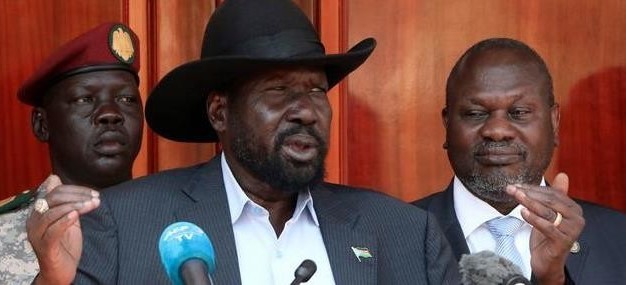President Salva Kiir's group and the main opposition SPLM-IO have disagreed on how to divide up the ministries for the new power-sharing government.
According to the peace deal, the unity government will have 35 ministries split up between the group of Salva Kiir, the SPLM-IO of Riek Machar, the South Sudan Opposition Alliance (SSOA), the SPLM-FDs, and other political parties.
Kiir's side will take 20 ministries, while Machar's group will take nine ministries. The SSOA will take three ministries, the SPLM-FDs will be given two ministries and other political parties will get one ministry.
The South Sudan Opposition Alliance (SSOA) and the Other Political Parties (OPP) said they had chosen their ministerial portfolios in a meeting held in Juba.
In an interview with Radio Tamazuj this afternoon, SPLM-IO Deputy Spokesman Manawa Peter said they disagreed in a meeting as Kiir's side wants to retain key ministries in the coalition government.
Manawa says that the previous government's insistence to retain key ministries is hampering direct negotiations. "Our negotiations with the government since yesterday reached a deadlock because they want to retain key ministries,” Manawa said.
“Kiir's side wants to retain finance, petroleum, defense and interior. The government wants to allocate ministerial portfolios to the other parties in order to control the ministries it wants,” he added.
The main opposition criticized the previous government for giving some ministerial portfolios to the parties without consultations.
“We are aware that the government has already allocated some ministries to the other parties without consultations with us. The move is against the peace agreement and we don’t recognize the process that took place. The key ministries must be split up between the parties to the peace agreement equally so that we can achieve reforms,” he said.
He added,” We have another meeting later today to discuss the same issue. So, if we fail to agree on the matter, we will follow what the peace agreement says.”
SPLM officials could not immediately be reached for comment.
The peace deal explains that each party to the peace agreement will nominate a minister on a rotational basis if the parties fail to agree on the allocation of ministerial portfolios. It means the government chooses the first ministry that it wants, followed by the SPLM-IO which chooses next, then the opposition alliance, and so on.




